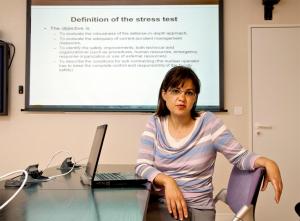Imagine the unimaginable
15 Jun 2012
-
Sabina Griffith
"We will look into the resistance of the facility in the face of a set of extreme situations leading to the sequential loss of the lines of defence—irrespective of the probability of this loss," explains Joëlle Elbez-Uzan, responsible for the ITER licensing procedure.
Following the nuclear accident at the Fukushima Daiichi Power Plant in Japan in March 2011, the European Union declared "that the safety of all 143 nuclear power plants [in Europe] should be reviewed on the basis of a comprehensive and transparent risk assessment." These assessments are known as stress tests.
As the first fusion reactor to undergo full nuclear licensing, ITER will also have to pass this complementary safety assessment, In the words of Licensing Officer Joëlle Elbez-Uzan, the stress tests are "a targeted reassessment of ITER's safety margins in the light of the events that occurred at Fukushima."
As the first fusion reactor to undergo full nuclear licensing, ITER will also have to pass this complementary safety assessment, In the words of Licensing Officer Joëlle Elbez-Uzan, the stress tests are "a targeted reassessment of ITER's safety margins in the light of the events that occurred at Fukushima."
"What this means, is that we will look into the resistance of the facility in the face of a set of extreme situations leading to the sequential loss of the ITER lines of defence—irrespective of the probability of this loss. In other words, we are imagining the unimaginable."
The type of extreme situation under examination: very severe flooding, a severe earthquake beyond that postulated in the ITER safety case, or a combination of both. "Special focus will be given to our crisis management plan describing how to react in such an extreme situation," explains Joëlle.
As a first step, the French regulator (Autorité de Sûreté Nucléaire, ASN) asked the ITER Organization to draft a report describing the methodology by which the stress tests will be performed. This report was sent to Paris on 15 January and the methodology has been approved.
The type of extreme situation under examination: very severe flooding, a severe earthquake beyond that postulated in the ITER safety case, or a combination of both. "Special focus will be given to our crisis management plan describing how to react in such an extreme situation," explains Joëlle.
As a first step, the French regulator (Autorité de Sûreté Nucléaire, ASN) asked the ITER Organization to draft a report describing the methodology by which the stress tests will be performed. This report was sent to Paris on 15 January and the methodology has been approved.
Currently the Safety, Quality & Security Department is carrying out its stress test evaluation and the outcome will be submitted to the authorities mid-September.


